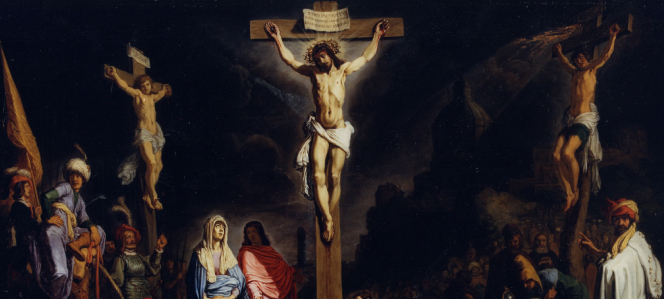Today the Church celebrates the Feast of the Exaltation of the Cross.
In one respect this great day commemorates the discovery of the relics of Christ’s crucifixion by the Roman Empress, Helena, in the fourth century and the dedication of the Church of the Holy Sepulchre in Jerusalem.
But in another respect, this feast celebrates the event of Christ’s Paschal Mystery, that awe-filled event in which God, in Christ, accepted the experiences of suffering and death, allowing himself to feel what we feel—even the terror of the sense of being abandoned by God.
Our first Scripture for today highlights the power of the cross to effect healing.
Hearkening back to the memory of ancient Israel, we remember how Moses was instructed to create the image of a bronze serpent and mount it on a pole. Those who looked upon this curious image were healed from the effects of snake venom.
This strange story is presented by the Church as a foreshadowing of the cross. What the cross effects is our healing—not simply from the venom of snakes but the power of sin and death.
In our second Scripture the apostle Paul praises the Lord Jesus who accepts death on the cross—not because he deserves such a horrifying punishment but so that he might use it as a means by which he would unite his divine life to us in all things, even suffering, even death.
For the Christian, because of God in Christ, suffering and death are not just sad and inevitable facts of human existence; they have become, in Christ, potential routes of access to God. Even in these experiences, God is present and working, and even through these experiences, God can accomplish his will to save and redeem.
In his Gospel, the Lord Jesus shocks our sensibilities by insisting that he has not come into this world to condemn humanity but to reconcile us to God.
Christ will use the cross as the means to do precisely this.
The cross displays in the most frightening way the darkest potential of our human nature. Christ does not deserve what is done to him on the cross. We impose the cross on him out of malice and cruelty. What we deserve for the cross is God’s wrath—plain and simple. The cross, which could never be the end of Christ, should mean the end of us!
But our end, our destruction, is not what the cross accomplishes. Instead, Christ show the willingness of God to forgive us in the most astounding way possible.
The cross reveals that the great covenant that God makes with us in Christ offers us the possibility of another chance. This grace is not deserved, but it is nevertheless given.
We can receive this grace in the Blessed Sacrament—indeed, in all the sacraments of the Church. Once we have received it ourselves, Christ asks that what we have been given, we pour into our relationships with others—imitating what Christ has done for us in the forgiveness that we share with one another.
